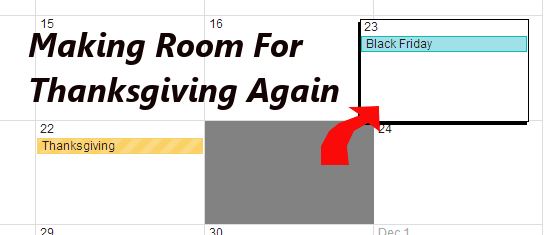Moving Black Friday Up A Week Could Save Thanksgiving Image courtesy of We're just sayin'...
More precisely, we’re proposing that all those doorbusters either begin on the Friday night or early Saturday morning the weekend before Thanksgiving.
Here’s why:
It’s Inevitable
Walmart and Target and all the other early-openers would not be throwing open their doors on Thanksgiving night if they weren’t making money. This means that for all the people who complain about Black Friday Creep, there are enough people lining up at all hours of the night in the hope of getting their hands on a few, deeply discounted items. And now that Thanksgiving night sales are becoming the norm, good luck trying to get this lion back in the cage.
Some retailers have already dipped their toes into this water with “Pre-Black-Friday” sales. Back in 2009, Sears went so far as to declare Halloween weekend as “Black Friday,” but that was too soon and Sears is no longer the retail industry trendsetter it once was.
The real test will be when a major retailer opens up Thanksgiving morning. We imagine it will be a success, and if so, you’ll soon see Wednesday night, then Tuesday, etc.
This gradual process would likely take several years and just inflame ill will on both sides of the debate. We say it’s best just to avoid that civil war and move forward with the healing.
Getting It Out of the Way
If you start the holiday shopping season a full six days earlier than usual, it gives consumers almost a full week to get that bargain shopping done before they sit down with their family for their annual festival of repressed loathing and turkey.
Speaking of being with family, many Americans do at least some traveling to see their kin during the holiday. By separating Black Friday weekend from Thanksgiving weekend, those who have to travel and want to go shopping have one fewer thing to worry about.
For stores, having those six days before Thanksgiving could lead to some creative marketing, especially since several folks take at least one day off from work in the lead-up to the holiday. So a retailer could do its doorbuster deals in the first day, then offer more specialized sales each day during the days that follow.
It may also help retailers avoid disasters like BestBuy.com’s Black Friday mess of 2011, where the company oversold some items and didn’t realize until right before Christmas that some customers would not get their orders in time. That extra weeks give online retailers an extra week to fill orders, and it gives consumers an extra week to shop elsewhere if that order can’t be fulfilled.
[NOTE: A forward-looking reader points out that an early Black Friday would work out great for Chanukah next year, as the holiday is actually going to start before Thanksgiving. This way, folks could get all that Black Friday shopping out of the way and not have it overlap.]
Historical Precedent (Sort Of)
Back in 1939, President Roosevelt not only thought about shifting the calendar relationship between Thanksgiving and the holiday shopping season, he actually did something about it. He just did the wrong thing.
Convinced that the late date of Thanksgiving in 1939 (Nov. 30) would hurt retailers’ holiday sales, FDR made the decision to just move Thanksgiving up a week.
That didn’t go over well and “Franksgiving” became a politically divisive issue with only half the states abiding by the President’s non-binding declaration.
In spite of this, FDR declared that Thanksgiving was third Thursday in both 1940 and 1941. For the 1942 holiday, Congress passed a resolution setting the holiday back in the final-Thursday-of-November spot it had enjoyed since 1863. But it was a Senate amendment that ultimately situated Thanksgiving in the fourth-Thursday position, where it’s been for 70 years.
In Retrospect
During FDR’s time — and really up until the 1990s — it would be unthinkable to move Black Friday up, as it was simply understood that the holiday shopping season began the day after Thanksgiving. If he’d had the thought to suggest that retailers get the Christmas ball rolling a week early, instead of trying to change a holiday that had gone unchanged since Abe Lincoln, it’s a change that might have stuck.
By splitting up Thanksgiving and Black Friday weekends, you take away the annoyances of doorbuster sales infringing on a beloved holiday without taking away the big sales that lots of people genuinely look forward to each year.
Want more consumer news? Visit our parent organization, Consumer Reports, for the latest on scams, recalls, and other consumer issues.


